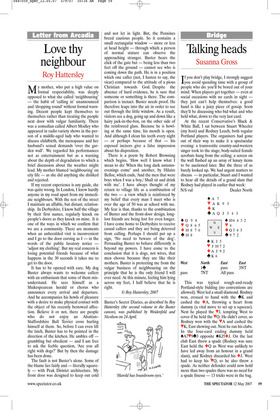Bridge
Talking heads
Susanna Gross
If you don’t play bridge, I strongly suggest you avoid spending time with a group of people who do: you’ll be bored out of your mind. When players get together — even at social occasions with no cards in sight they just can’t help themselves: a good hand is like a juicy piece of gossip. Soon they’ll be discussing who bid what and who held what, down to the very last card.
At the recent Conservative’s Black & White Ball, I sat between Stuart Wheeler (my host) and Rodney Leech, both regular Portland players. The organisers had gone out of their way to make it a spectacular evening: a transvestite country-and-western singer took to the stage; body-suited female acrobats hung from the ceiling; a screen on the wall flashed up an array of luxury items to be auctioned later. But the three of us barely looked up. We had urgent matters to discuss — in particular, Stuart and I wanted to hear all the details of a grand slam that Rodney had played in earlier that week: N/S vul Dealer North This was typical rough-and-ready Portland-style bidding (no conventions are allowed). West led a small diamond. Rodney won, crossed to hand with the ♣K and cashed the ◆A, throwing a heart from dummy (a vital move to set up a squeeze). Next he played the ♥J, tempting West to cover if he held the ♥ Q. He didn’t cover, so Rodney won with the ♥A and cashed the ♥K, East showing out. Next he ran his clubs. In the four-card ending dummy held ♠A7♥9♣ 3 opposite ♠KJ5◆J. On the last club East threw a spade (Rodney was sure East held the ◆Q as West was unlikely to have led away from an honour in a grand slam), and Rodney discarded his ◆J. West had to keep his ♥Q, so he also threw a spade. As neither defender could now hold more than two spades there was no need for a spade finesse — 13 tricks were in the bag.










































































 Previous page
Previous page